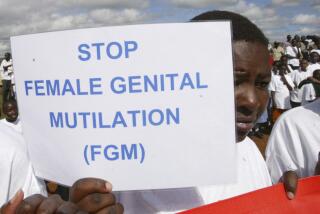Circumcision promoted to curb spread of HIV
- Share via
Mbabne, Swaziland — Nelson Mdlovu strides out of a small clinic with a spring in his step and a smile on his lips, just minutes after being circumcised.
Mdlovu swallowed his fears to line up with nine other equally nervous men for the 30-minute operation. They joined the ranks of hundreds of Swazi men who have opted for circumcision, after the United Nations said last year that the procedure could cut the risk of contracting HIV by as much as 60%.
With the help of training from Israeli surgeons, Swaziland leads the African rush to embrace an ancient surgery to fight a modern scourge.
Its zeal is born of desperation. Swaziland suffers from the world’s highest HIV rates -- nearly 40% of pregnant women and 19% of its 1.1 million people are infected. Life expectancy has halved to 31 years in just a decade.
Mdlovu said he believed circumcision would change his life.
But there are fears that some men might foolishly believe that circumcision gives them immunity, and indulge in risky sexual behavior.
“It doesn’t mean you are 100% protected,” nurse Prudence Mkhatshwashe tells the men clutching pink tickets in the waiting room. “You are just 60% protected, and you can get infected with the other 40%.”
“Use a condom always. Don’t compromise,” she orders, before giving care and hygiene instructions -- no running, no playing football and above all no sex -- for six weeks until healing is complete. The scene repeats itself daily at the clinic run by the Family Life Assn. of Swaziland.
The AIDS epidemic has reversed all Swaziland’s economic and social gains since independence from Britain 40 years ago. In a country with only 170 doctors, mass male circumcision, which requires local anesthetic and a surgeon, will put additional demands on overstretched facilities.
But the government and the Family Life Assn. are determined to press ahead, saying the benefits of the operation far outweigh the costs.
“If you had a vaccine with a 60% effectiveness rate, every government would force people to line up and have it,” says Derek von Wissel, director of Swaziland’s National Emergency Response Committee on HIV/AIDS.
Universal male circumcision in sub-Saharan Africa could prevent 5.7 million new infections and 3 million deaths over 20 years, according to studies cited by the U.N.
The World Health Organization and other agencies are trying to provide technical support to the Swazi government. Teams of Israeli surgeons -- who circumcised tens of thousands of adult men in keeping with religious traditions during the mass migration of Jews from the former Soviet Union in the early 1990s -- have trained 10 Swazi doctors and backup staff to perform the operation quickly and safely with limited resources.
Inon Schenker, who coordinated the Israeli missions to Swaziland, says his organization, the Jerusalem AIDS Project, has several dozen surgeons ready to help African countries scale up adult male circumcision by training local health workers in surgical techniques and counseling. Swaziland is the only country in which the Israelis are working, though they’ve been asked by Rwanda, Namibia and Zambia, among others.
An estimated 665 million men, or 30% of the world’s total, are circumcised for religious or cultural reasons. But in Swaziland and many other southern African nations it is rare.
The snip of the foreskin is just part of a much wider AIDS-prevention package, which also includes testing, counseling and condom promotion. In many African countries, including Swaziland, less than 10% of men have had an HIV test.
WHO and UNAIDS recommended last year that HIV-positive men should not be circumcised. But Kim Eva Dickson, an HIV prevention expert at WHO, says countries offering male circumcision can only encourage men to take an HIV test first, not force them.
“What we want to avoid is that men who are circumcised think they are HIV-negative,” she says, adding that it’s important to spread this message among women as well. She says a follow-up study of circumcised men in Kenya had no conclusive evidence of an increase in risky sexual behavior.
Mdlovu said he was more nervous about the HIV test than the operation. He was also alarmed at the prospect of sleeping alongside his wife for more than a month without being able to have sexual intercourse. His concerns were shared by the other men, who repeated “six weeks, six weeks?” at regular intervals. If men have sex before the wound is healed, the risk of HIV infection increases.
Von Wissel, the head of the emergency committee, says spending on HIV/AIDS this year is $36 million -- and even that’s not enough to tackle an epidemic that is destroying the fabric of Swazi society. Food production has plummeted because sick families are too poor to buy seeds and too weak to plant crops. School attendance is down. There are an estimated 130,000 orphans and vulnerable children.
More to Read
Sign up for Essential California
The most important California stories and recommendations in your inbox every morning.
You may occasionally receive promotional content from the Los Angeles Times.













